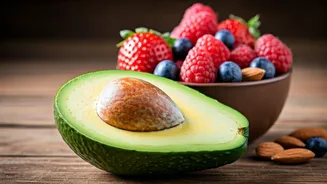Fiber's Crucial Role
Fiber, an indigestible carbohydrate, is vital for maintaining a healthy gut. It acts as a prebiotic, nourishing the beneficial bacteria residing in your
gut. These bacteria play a crucial role in digestion, nutrient absorption, and immune function. Fiber also helps regulate blood sugar levels, reduces the risk of heart disease, and promotes healthy weight management by increasing satiety. A diet rich in fiber can prevent and alleviate constipation, diverticular disease, and other digestive issues. It's often categorized into two types: soluble and insoluble fiber. Soluble fiber dissolves in water and forms a gel-like substance, aiding in cholesterol reduction. Insoluble fiber adds bulk to the stool, promoting regular bowel movements.
Apples and Pears
Apples and pears are excellent sources of soluble fiber, particularly pectin. This type of fiber helps to slow down the digestion process, allowing for better nutrient absorption. They are easily accessible and versatile, offering a sweet and crunchy addition to various meals. Apples can be enjoyed as a snack, added to salads, or incorporated into baked goods. Pears, similarly, can be eaten fresh, cooked, or used in smoothies. Both fruits also contain vitamins and antioxidants, boosting overall health. Fiber in these fruits can help regulate blood sugar levels, reducing the risk of type 2 diabetes. Furthermore, the antioxidants in apples and pears contribute to reducing inflammation and protecting against chronic diseases.
Berries Abound Benefits
Berries, including strawberries, blueberries, raspberries, and blackberries, are packed with both soluble and insoluble fiber. They are also rich in antioxidants, contributing to overall health. Their high fiber content promotes healthy digestion, helping prevent constipation and improve bowel regularity. Furthermore, berries can contribute to improved blood sugar control. The antioxidants in berries, such as anthocyanins, have anti-inflammatory properties, protecting against chronic diseases. Berries can be consumed fresh, frozen, or added to yogurt, oatmeal, or smoothies. Their natural sweetness makes them a healthy alternative to sugary snacks. Consuming berries regularly can improve gut health, boost immunity, and provide a variety of essential nutrients.
The Marvelous Legumes
Legumes, such as lentils, beans, and peas, are nutritional powerhouses, providing substantial amounts of both soluble and insoluble fiber. They are also packed with protein and various micronutrients. Legumes have the capability to promote gut health by nourishing beneficial gut bacteria. The fiber in legumes can help regulate blood sugar levels, leading to improved overall health. Legumes offer a variety of ways to be incorporated into the diet. For instance, lentils and beans can be added to soups, stews, and salads. Peas can be used as a side dish or included in stir-fries. Eating legumes regularly helps improve digestion, boost immunity, and provide essential nutrients. They also contribute to a feeling of fullness, aiding in weight management.
Whole Grains' Power
Whole grains, such as oats, brown rice, quinoa, and whole-wheat bread, are rich in fiber, particularly insoluble fiber. Insoluble fiber adds bulk to the stool, promoting regular bowel movements and preventing constipation. Whole grains also provide essential nutrients, including B vitamins, iron, and magnesium, promoting overall health. The fiber in whole grains helps to regulate blood sugar levels, reducing the risk of type 2 diabetes. They contribute to heart health by lowering LDL cholesterol levels. Whole grains can be easily incorporated into the diet by choosing whole-grain bread, cereals, and pasta. Eating oatmeal for breakfast, adding brown rice to meals, or using quinoa in salads are some easy ways. Regular consumption of whole grains improves digestion, boosts energy levels, and contributes to overall wellness.












